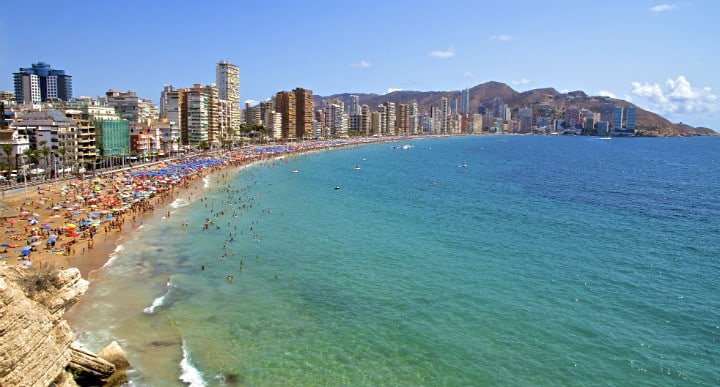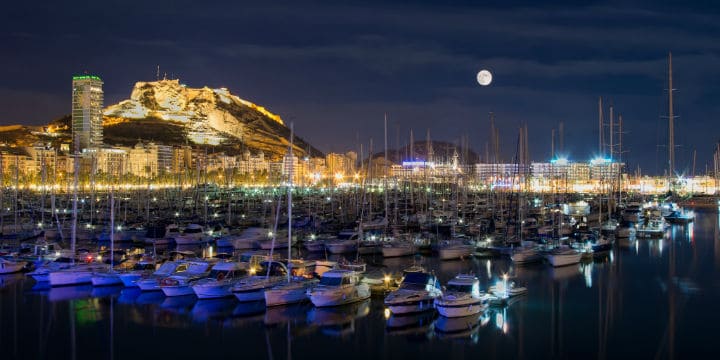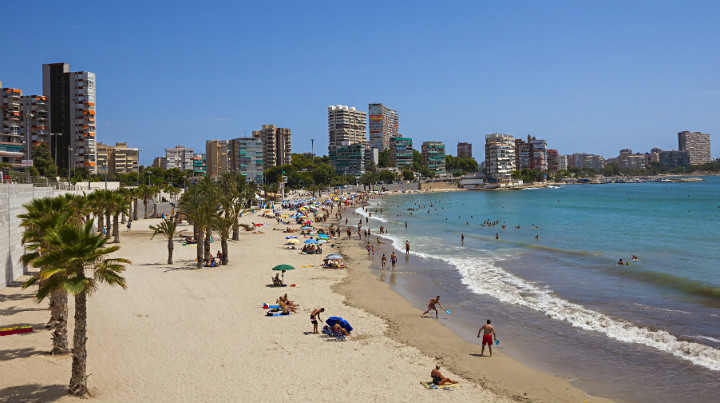
Gay Alicante · City Guide
Planning a trip to Alicante? Then our gay Alicante city guide is for you

Alicante | Alacant
Capital of the Alicante community and part of the Valencian Community. Alicante is a port city on the Costa Blanca home to just over 300,000 people and the heart of a a metropolitan area of 750,000, making it Spain's eighth largest.
With settlments stretching back to prehistoric times, the Greeks and Phoenicians established trading ports here before being conquered by the Cartheginians and the Romans. It was occupied by the Moors until the late 13th Century. In the Spanish Civil War it was the last Republican loyalist city to be occupied by Franco.
In the 1980's, Alicante's port went into industrial decline however in recent years it has cemented itself as a top destination for tourist cruises. In fact the city has become known as a top tourist destination with visitors attracted to the city for it's beautiful beaches and pleasant climate.
Gay Scene
Although nearby Benidorm has more to offer in terms of gay venues, there are still a good selection of establishments catering to gay customers in Alicante. Here you will find bars, saunas and a cruise club, with most venues close to the sea front. In July there is an annual Pride Festival.
Getting to Alicante
By plane
Alicante–Elche Airport (ALC) is the fifth busiest airport in Spain and is about 9km south west of Alicante. it is mostly connected to destinations in Europe by budget and charter airlines with some services to North Africa. Flag carriers offer connections to European hubs.
Bus line C6 leaves every 20 minutes between 6am and 11pm and takes you into the city centre in around 20 minutes. Tickets cost €3.85 one way and can be purchased from the driver.
Taxis can be easily caught at arrivals however in high season you may queue for a while if you haven't pre-ordered or arranged travel beforehand. Journeys will cost around €20-25 and will take around 10-15 minutes to get you to the centre. Car hire is available at the terminal.
By boat
Alicante is a popular destination for cruises and you may arrive in the city by cruise ship. It is 15 minutes walk from the port to the city but there is also a free shuttle bus. There are also scheduled ferry services to the Balearic Islands as well as ferries to Algeria.
By train
Alicante is well connected to destinations in the region but a number of direct trains run to Madrid (3 hours) and Barcelona (5 hours) everyday. From the major cities you can connect to the European rail network and travel further afield.

Getting around Alicante
On foot
If you are staying in the Old Town, you will find that most of the main sights are on your doorstep so getting around on foot is pretty much a no-brainer. You will only need to take public transport if you need to travel further afield or in bad weather.
By bus
Bus run from around 6:30am-11pm with some limited night bus services available. Single journeys start at €1.25 and can be purchased from the driver. A recharchable card with 10 journeys costs €7.25 (+ €2 for the card) and can be purchased at the TAM office near the central market.
By tram
Mostly a commuter service, this is a useful way of travelling if you're staying further afield or for day trips along the Costa Blanca. Singles start at €1.35 for one zone with returns costing €2.30. You can purchase tickets from the machines at the stations.
Where to Stay in Alicante
Alicante has an excellent choice of hotels to suit all budgets. The best hotel offers in Alicante can be found on our Gay Alicante Hotels page.
Things to See & Do
Castle of Santa Barbara - one of the largest medieval fortifications in Spain. This imposing castle was built in the 9th Century by the Moors. From the top of the hill are amazing views of Alicante (don't worry, there's an elevator!).
Beaches - naturally one of Alicante's main draws is it's glorious sandy beaches. Postiguet Beach is in the city centre but a short trip away is the 7km stretch of sand that is San Juan beach.
Tabarca - a short ferry ride takes you to an island trapped in another era! Tabarca is like a living, breathing time capsule and wildlife sanctuary. Bring cash as there are no ATMs on the island.
Archaeological Museum of Alicante (MARQ) - with artefacts from the stone age onwards, the archaeological museum offers a multi-media history lesson of Alicante and the surrounding area.
Central Market - to get a feel for life as a local of Alicante head to the central food market. Here you will find a wide range of fresh food including seafood plucked fresh from the sea. You will also find a flower market out the backc.
Asegurada Museum of Modern Art (MACA) - a free museum with a surprisingly good collection. Expect to see works by Picasso, Miro and Braque as well as other local artists.

When to Visit
Unsurprisingly, summers are exceptionally pleasant here, so Alicante is a tourist magnet in the summer months. Winters are relatively mild with an average January temperature of 12°C. To avoid the crowds and enjoy pleasant weather, aim to arrive in late spring or early fall.
Like many Spanish cities, Alicante hosts many festivals and events all year. These include the Carnival just before Lent, with masked parades and open-air concerts. Las Hogueras de San Juan is the city's main festival in June and sees specially made monuments burned and fireworks let off.
Money
Spain is a Euro area country. Cash dispensers are widely available. Credit and debit cards are widely accepted. Hotels, banks and some local businesses also operate foreign exchange desks.
Join the Travel Gay Newsletter
Have we got something wrong?
Are we missing a new venue or has a business closed? Or has something changed and we have not yet updated our pages? Please use this form to let us know. We really appreciate your feedback.